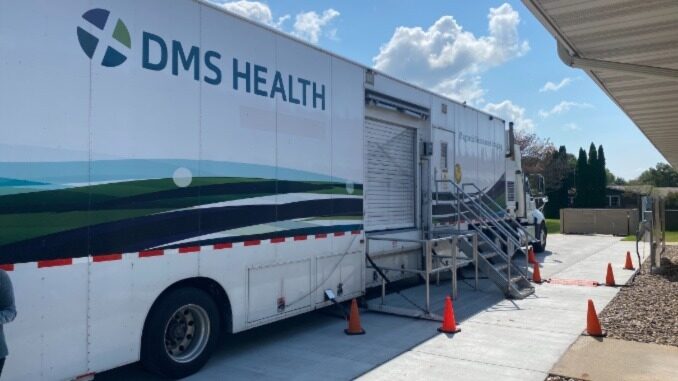
LA CROSSE, Wis. ― MRI services are now offered at Mayo Clinic Health System in Prairie du Chien. The mobile MRI unit will be available for patients every Wednesday.
“There are patients in the area who will benefit from this service being offered here. It improves the patient experience,” says Ted Hanson, M.D., chair of the Department of Radiology for Mayo Clinic Health System in Southwest Wisconsin. “This imaging service will help our providers diagnose and evaluate injuries, diseases and other medical issues to help our patients.”
The mobile unit consists of a 1.5-tesla MRI unit. The scanner is faster than lower-strength MRIs and is ideal for health care professionals to view the abdomen and chest. The magnet can be used to run shorter scan times, reduce possible motion distortion and create higher-quality images.
“The images produced by an MRI enable the radiologist to examine both healthy and unhealthy tissue to develop an understanding of disease processes and injuries at a very high level of detail. We are happy to be able to offer quality Mayo Clinic care in our area,” adds David DeHart, M.D., the physician leader at Mayo Clinic Health System in Prairie du Chien.
MRIs are routinely used to assess:
- The brain and skull for signs of stroke, aneurysm, tumors and neurodegenerative diseases.
- The heart and circulatory system to evaluate the structure and function of the heart or aorta to assess the extent of damage following a heart attack or because of heart disease, or to look for inflammation and blockages in blood vessels.
- Internal organs, including the liver, kidneys, uterus, pancreas, spleen, ovaries and prostate.
- The breasts in women with dense breast tissue, or when screening or diagnostic mammography reveals abnormalities that require additional imaging.
- The bones and joints to evaluate conditions like arthritis, disc disease, bone infections or tumors, or other injuries or abnormalities that affect the function of joints.
MRIs also may be used to evaluate the effects of ongoing medical treatments for chronic conditions, or before or after surgery.
During the MRI procedure, Dr. Hanson says patients will lie on an exam table that passes through the MRI machine.
“As the magnetic field moves around you, the MRI machine will make tapping or thumping noises that can be loud at times,” Dr. Hanson explains. “Depending on the extent of the exam, your MRI may last up to an hour and sometimes a little longer. Once the MRI is complete, patients can resume normal activities.”
“Having MRI services available in Prairie du Chien is significant for patients who may otherwise need to travel to Onalaska, La Crosse or elsewhere to receive this service. It improves the patient experience when they have more options for care close to home,” says Dr. DeHart.
MRI services also are offered at Mayo Clinic Health System locations in La Crosse, Onalaska and Tomah.
